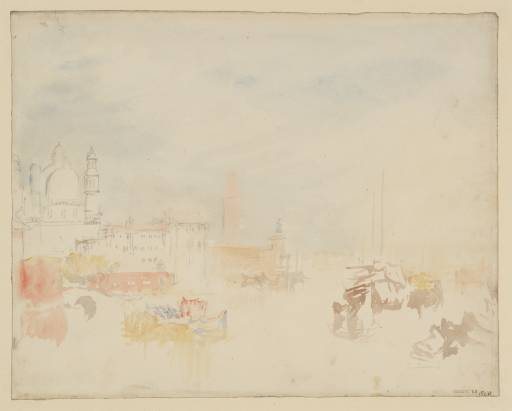Joseph Mallord William Turner The Canale della Giudecca, Venice, with Boats Moored off Santa Maria della Salute and the Dogana 1840
Joseph Mallord William Turner,
The Canale della Giudecca, Venice, with Boats Moored off Santa Maria della Salute and the Dogana
1840
Joseph Mallord William Turner 1775–1851
The Canale della Giudecca, Venice, with Boats Moored off Santa Maria della Salute and the Dogana 1840
D32170
Turner Bequest CCCXVI 33
Turner Bequest CCCXVI 33
Pencil and watercolour on white wove paper, 244 x 307 mm
Watermark ‘C Ansell | 1828’
Blind-stamped with Turner Bequest monogram towards bottom right
Inscribed by John Ruskin in blue ink ‘1560’ bottom right
Stamped in black ‘CCCXVI 33’ bottom right
Watermark ‘C Ansell | 1828’
Blind-stamped with Turner Bequest monogram towards bottom right
Inscribed by John Ruskin in blue ink ‘1560’ bottom right
Stamped in black ‘CCCXVI 33’ bottom right
Accepted by the nation as part of the Turner Bequest 1856
Exhibition history
1904
National Gallery, London, various dates to at least 1904 (659, as ‘Venice. The Dogana and the Salute’).
References
1904
E.T. Cook and Alexander Wedderburn eds., Library Edition: The Works of John Ruskin: Volume XIII: Turner: The Harbours of England; Catalogues and Notes, London 1904, p.638 no.659, as ‘Venice. The Dogana and the Salute’.
1909
A.J. Finberg, A Complete Inventory of the Drawings of the Turner Bequest, London 1909, vol.II, p.1021, CCCXVI 33, as ‘The Dogana and the Salute. Exhibited Drawings, No.659, N.G.’.
1930
A.J. Finberg, In Venice with Turner, London 1930, pp.122, 125, 174, as ‘The Salute and Dogana, from the Giudecca’, 1840.
2003
Ian Warrell in Warrell, David Laven, Jan Morris and others, Turner and Venice, exhibition catalogue, Tate Britain, London 2003, pp.181, 259, fig.192 (colour), as ‘Boats Moored in the Giudecca Canal, near the Dogana, with the Back of the Salute’, 1840.
The setting is the eastern end of the Canale della Giudecca, off the bridge over the entrance to the Rio della Salute on the Fondamenta Zattere Ai Saloni, the shadow beneath its arch and its reflection indicated with a curving stroke of wash only, aligned with the southern end of the Baroque church of Santa Maria della Salute. To the right of the bridge is the Seminario Patriarcale, with the porch of the Dogana beyond at the centre, overlooking the Bacino. Above the low south front of the Dogana, the campanile of San Marco (St Mark’s) rises to the north-east.
Distant forms dissolve beyond the boats on the right, with only loose wash indications of the Riva degli Schiavoni waterfront stretching east beyond the Bacino. The stark, glaring light suggests that the scene is presented in the late morning or around noon. Ian Warrell has noted that ‘Turner’s fondness for these moorings at the eastern end of the Giudecca canal is readily apparent’ from various 1840 watercolours (see also Tate D32147, D32163, D32172, D32174; Turner Bequest CCCXVI 10, 26, 35, 37), ‘some of his most delicate studies of Venice, faintly developed in thinly coloured washes’.1
Technical notes:
Pencil work is restricted to the Salute and Seminario; otherwise the composition has been built up with confident strokes of a limited range of washes, leaving much of the foreground bare. Finberg gave a lyrical description of Turner’s technique here and in similar Venice studies, albeit noting ‘languid and careless’ pencil work:
But attention is diverted from the line-work by the skilful washes and touches of colour with which they are enlivened. Portions of the white paper are generally left uncovered, and small touches of very pale grey, blue, yellow and red are scattered here and there. The effect in the slighter drawings, like cccxvi, 2 [D32139], 4 [D32141], and 33, is quite charming, because all the touches and washes of colour are so pretty in themselves, and they unite so well with each other and with the white paper. Turner is such a consummate master of picture-making that he can work wonders even with a few formless but artfully places touches or blobs.1
This is one of numerous 1840 Venice works Ian Warrell has noted as on sheets of ‘white paper produced [under the name] Charles Ansell,2 each measuring around 24 x 30 cm, several watermarked with the date “1828”’:3 Tate D32138–D32139, D32141–D32143, D32145–D32147, D32154–D32163, D32167–D32168, D32170–D32177, D35980, D36190 (Turner Bequest CCCXVI 1, 2, 4–6, 8–10, 17–26, 30, 31, 33–40, CCCLXIV 137, 332). Warrell has also observed that The Doge’s Palace and Piazzetta, Venice (National Gallery of Ireland, Dublin)4 and Venice: The New Moon (currently untraced)5 ‘may belong to this group’.6
Albeit Peter Bower, Turner’s Later Papers: A Study of the Manufacture, Selection and Use of his Drawing Papers 1820–1851, exhibition catalogue, Tate Gallery, London 1999, p.81, notes that the Muggeridge family had taken over after 1820, still using the ‘C Ansell’ watermark.
Verso:
Blank; inscribed in pencil ‘33’ towards top right; stamped in black ‘CCCXVI – 33’ over Turner Bequest monogram below centre; inscribed in pencil ‘D32170’ bottom right.
Matthew Imms
July 2018
How to cite
Matthew Imms, ‘The Canale della Giudecca, Venice, with Boats Moored off Santa Maria della Salute and the Dogana 1840 by Joseph Mallord William Turner’, catalogue entry, July 2018, in David Blayney Brown (ed.), J.M.W. Turner: Sketchbooks, Drawings and Watercolours, Tate Research Publication, December 2019, https://www

